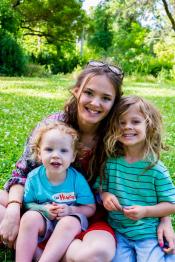Amber Poeschel
Amber Poeschel: Unplanned Changes
“I battled anxiety and depression my whole life, but postpartum was much different because it wasn’t just affecting me, it was affecting my whole household, which was more of a risk. When you know that your children are being affected, the guilt comes on. I felt like I had no freedom, no identity. I felt very alone and misunderstood. It was very lonely. I just wasn’t happy when I had every reason to be. I wasn't eating and I was getting no sleep, which is normal for moms anyways, but sleep deprivation just makes everything worse.

My first pregnancy was supposed to be a home birth, but he ended up being an emergency and we had to transfer out of midwifery care. I had a very traumatic birth in the hospital, which was exactly what I was trying to avoid. Then, I was left to take care of this baby by myself. We had horrible nursing experiences, which we got through together, but it was very lonely. With my second baby, I was a good candidate to have a home birth, so we went for it. They let me have control over my healthcare. They were aware of what I had been through and that they weren’t going to leave me alone during birth. I went into my birth feeling educated and supported and my postpartum experience was much better. I felt like I had control over my body again, which helps you feel like you have control over your life.
Parenting definitely humbles you. I’m raising little boys in a world where boys are not taught how to respect women. I have to be strong and be the type of woman that they hopefully marry. Yet, I also want to be vulnerable and raw and honest with them. I want them to see how to carry a woman through that. So, I can have all my issues, but at the end of the day I have to help them live in this world.”

Talking & Treatment
“For tools and treatment, I heavily relied on Women, Infants and Children (WIC). They kind of became my family when I didn’t really have one. I had friends, but when your entire village is also depressed and anxious, it doesn’t offer much support. You can listen to each other but if nobody is healthy, nobody is there to lift the other up. I needed somebody healthier and wiser to tell me that things would be OK. For me, it was the women at WIC who did that.
I sought out programs like WIC not for the financial help, but to meet with somebody once a month who remembered me and who remembered my kids. They asked about my goals in life, told me that I was doing great and gave me healthy advice. Those small glimpses of interaction with another human who genuinely cared about me kept me grounded. Attending meetings and receiving phone calls from a peer counselor made a difference for me.
While I’ve sought help, I’m still struggling. It’s still hard. I’m still depressed. I’m raising humans to become good humans and that is intense. I’m grateful for the women in my life who have carried me through. Instead of critiquing my parenting, they’ve filled in some gaps. The world is intense. We just have to get through it and lean on each other a little bit.”

Reaching Out
“There’s a lot of shame and stigma surrounding postpartum depression and anxiety, especially since babies are the happiest thing to happen to us. People believe that if we get ourselves pregnant, it’s our job to get through it. I don’t think signing up for a baby necessarily means signing up for mental health issues, but that’s how I was treated. There are also many expectations of parents that completely contradict each other. People from all angles told me what to do as a parent, and that left me confused and feeling guilty as if something went wrong.
Don’t be afraid to reach out for help. I worried that I would be shamed, guilted or shunned if I sought help. But there are people and groups out there that will respect your beliefs and will respect your culture, while simultaneously giving you a lot more options for help. It’s OK to branch out of what you know.”
Some call it the baby blues and some call it postpartum depression, but there are a range of perinatal mood and anxiety disorders that can affect mothers. Click below for stories told by six Shasta County moms. Their honest stories don't sugarcoat motherhood. Instead, they share their hardships -- during and after pregnancy -- and how they found support and joy in motherhood.
